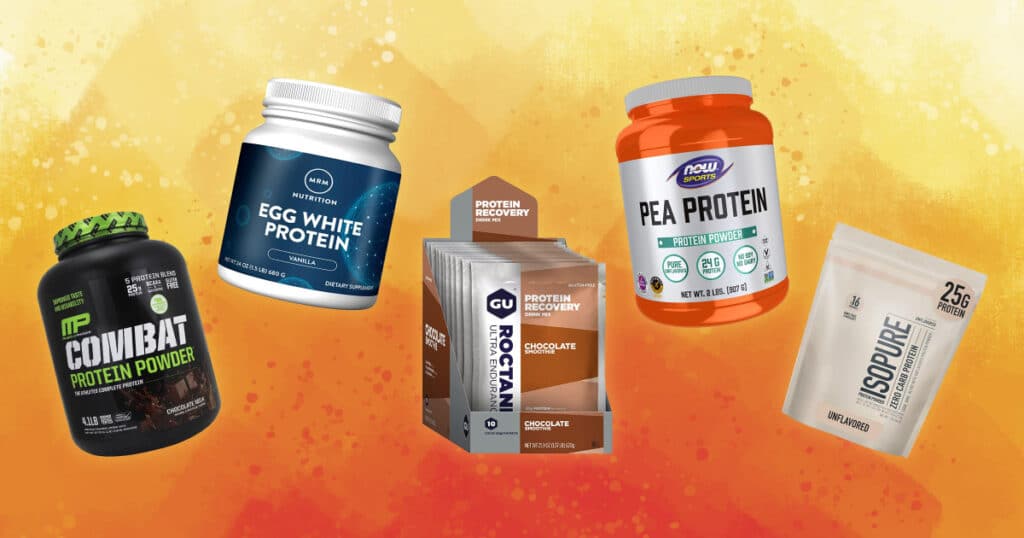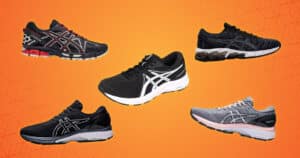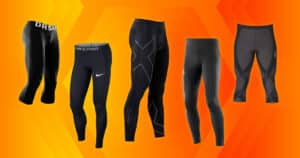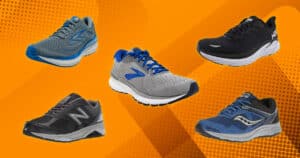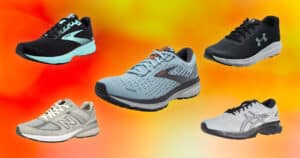Protein is an important element of everyone’s diet, not just runners’. It aids in the growth of muscle, the maintenance of existing muscle, and the improvement of recovery by allowing muscle fibres to mend more quickly after exercise.
It’s easy to forget about protein, especially if we rely on carbs to get us through training runs and races. A protein powder supplement is one approach to ensure we receive enough protein in our diet while also giving us an extra running boost. They’re a simple way to add protein to a recovery drink or smoothie, and some of them may even serve as a quick meal.
GU Roctane Protein Recovery Drink Mix is our #1 option. It’s made up of a premium blend of nutritious protein, fast-absorbing carbohydrates, and electrolytes to restore you after a long run. However, we’ve discovered a slew of the best protein powder for runners that perform just as well. Continue reading to see them all…
How to Choose The Best Protein Powder for Runners
Top 10 Best Protein Powder for Runners
- Gu – Roctane Protein Recovery Drink Mix
- Vega – Nutrition Sport Protein
- MusclePharm Combat Protein Powder
- Garden Of Life – Sport Certified Grass Fed Whey
- Isopure – Zero Carb Protein
- Mrm – Egg White Protein
- Now – Sports Pea Protein Powder
- Nutricost – Organic Rice Protein
- Nutricost – Casein Protein
- Bob’s Red Mill – Soy Protein
How to Choose The Best Protein Powder for Runners
Let’s discuss about what to look for in a protein powder. Some elements, like as protein quality, are unavoidable, while others may be tailored to your own preferences.
To begin, make sure your protein powder is full. A complete protein is one that has enough levels of all necessary amino acids, which are those that the body cannot create on its own.
Although all animal proteins are complete, the majority of plant proteins are not. As a result, plant-based protein powders should include protein from a variety of plant proteins that work together to make a complete protein.
Even entire proteins, however, differ in quality. The best proteins have a high biological value, which means that a large portion of the protein consumed is absorbed and utilised by the body.
Animal protein sources, particularly whey and egg, are biologically superior than plant-based sources like rice and soy.
Other Ingredients to Keep an Eye On
BCAAs, or branched-chain amino acids, are a kind of amino acid that is particularly beneficial for muscle development and repair. Most protein mixes include them naturally, but extra quantities can be added. This article discusses the finest BCAAs for runners.
Artificial sweeteners have a structure that is similar to glucose, but their orientation is reversed. As a result, they have a sweet taste but cannot be absorbed by the body. In order to meet diet culture’s allure to low-calorie meals, protein powders frequently incorporate artificial sweeteners instead of sugar.
Thickeners or Fillers: To enhance texture, protein powders may contain a variety of thickeners or fillers. For one thing, milk solids are a low-cost bulking ingredient that may significantly enhance the amount of protein powder.
Fortified nutrients: Protein powders may also be enriched with other nutrients, such as vitamins and minerals, to benefit the body. Although most protein powders include enough calcium, vitamin D is required for calcium absorption, thus many manufacturers include it in their mixes.
1. Gu - Roctane Protein Recovery Drink Mix
Our favourite pick among the best protein powder for runners is GU Roctane Protein Recovery Drink Mix, which does a lot more than just add additional protein to your day.
This is the ideal post-workout recovery drink because it has both carbohydrates and protein replacement. One dish replaces 230 calories burned during exercise.
Those 230 calories will provide you with 20 grams of easily digested whey isolate protein, 30 grammes of carbohydrates to refuel, and a healthy dose of electrolytes that you likely lost during your run (230mg of sodium, 200mg potassium, 40mg magnesium, and 100mg calcium).
Chocolate and vanilla bean are the only flavours offered. You may combine the two with water or milk, or add a scoop of powder to a smoothie mix for a unique flavour.
It’s ideal to consume it soon after a workout or a run. You may take it at any time during the day, but taking it at the recommended time will give you the best effects.
Pros:
• Whey protein isolate (20 g)
• Natural flavour
• L-glutamine and L-arginine are present.
• Aids your body’s hydration
Cons:
• When mixed with 8oz of water, the protein may be a little thick, but combining it with 16 oz may leave a harsh aftertaste.
2. Vega - Nutrition Sport Protein
Many protein powders include whey, a milk component that is incompatible with vegan diets. However, plant-based protein powders are available, and Vega’s product might be the right fit for you.
The protein content is provided from pea protein and peanut flour. Unfortunately, if you have a peanut allergy, you should stay away from this one.
It’s USDA certified organic, and it’s loaded with probiotics and antioxidants to boost your immune system. Each serving contains 170 calories and 30 grammes of high-quality protein. At six grammes, the carbohydrate level is smaller.
Sugar, gluten, and animal ingredients are all absent from this powder. It is not vegan in the strictest sense, however, because it is manufactured at a facility that also processes non-vegan items.
Pros:
• Protein from plants.
• Carbohydrates are scarce.
• Probiotics and antioxidants are included.
• USDA Certified Organic.
Cons:
• Some people may find this protein powder to be too thick and gritty.
3. MusclePharm Combat Protein Powder
MusclePharm Combat Protein Powder is made up of five forms of whey protein. Each one digests at a distinct rate, ensuring that your muscles are well-supplied with amino acids for hours.
This great-tasting product is easy to combine and comes in four award-winning varieties. Whey protein hydrolysate, whey protein isolate, whey protein concentrate, egg albumin, and micellar casein are the main ingredients.
This product is simple to use and tastes fantastic. Because of its smooth, non-gritty texture, it can be made fast with just a shaker cup and some water. It’s excellent for before and after exercise, as well as any other time you need a protein boost.
Pros:
• Protein from plants.
• Carbohydrates are scarce.
• Probiotics and antioxidants are included.
• USDA Certified Organic.
Cons:
• Some people may find this protein powder to be too thick and gritty.
4. Garden Of Life - Sport Certified Grass Fed Whey
This protein powder is as natural as it gets for a powder. Its lack of extra hormones and antibiotics provides additional health benefits. It has no additional sweeteners and is gluten-free and soy-free.
The usage of a contaminated supplement is a common explanation used by busted dopers. Garden of Life has gone to great lengths to avoid being blamed for a cheater’s actions. You may use this protein powder for leisure running or competitive racing because it includes no forbidden chemicals.
You’ll get 24 grams of nutritious protein, six grams of carbohydrates, electrolytes, and more than six grams of branched-chain amino acids for 120 calories, which will help you, recover faster.
Pros:
• NSF Sport Certified.
• Essential amino acids are present.
• The Non-GMO Project has certified this product.
• Each serving contains 24 grams of protein.
Cons:
• The protein powder is sweetened with Stevia, which some individuals may find irritating.
5. Isopure - Zero Carb Protein
Why bother with low-carb when you can go completely carb-free? If you don’t want to increase your daily carb intake, this protein powder has none. It’s also cholesterol-free (mixing it with milk will of course negate this) All of its advantages are focused on protein, and each 100-calorie scoop contains 25 grams of protein.
This protein powder also contains nearly six grams of BCAAs, so it will help you recover faster while not adding carbohydrates.
Pros:
• Each scoop contains 25 grams of protein.
• No carbohydrates.
• Zero fat.
• Vitamins and minerals have been added.
Cons:
• It does not appear to blend as well as other protein powders.
6. Mrm - Egg White Protein
Although whey protein isolate is not technically “dairy,” if you are allergic to dairy, you should avoid it just in case.
And if you do that while still looking for a protein powder that won’t upset your stomach, this egg-based powder could be the one for you.
Because it is lactose and gluten free, there should be less stomach problems. (To be clear, whey protein isolate does not include lactose; however, some whey powders do contain lactose, which is a sugar found in milk.)
MRM Digest-ALL, a nutritional supplement made entirely of plant-based enzymes, is included in this protein blend to aid digestion.
Pros:
• Each serving has 120 calories.
• Each serving contains 23 grams of fat-free protein.
• Gluten-free and lactose-free.
• Essential amino acids are present.
Cons:
• This protein powder is sweetened with Stevia and monk fruit, which may be excessively sweet for some people.
• People who are allergic to eggs may develop gastric problems.
7. Now - Sports Pea Protein Powder
This protein isolate is non-GMO and acceptable for severe vegans and vegetarians. The protein isolate is made from yellow peas and does not contain any animal products.
It also has the Informed Sports mark of approval and an NPA A-rated GMP certification, which implies that not only the product, but every step of the production and packaging process has been checked for quality.
Because this protein powder is unflavored, it may be too bland to consume on its own. If you want, you may be creative and utilize it in cooking and baking.
Pros:
• Each serving has 120 calories.
• Essential amino acids are present.
• Each serving contains 24 grams of protein.
• There are no artificial tastes or colours.
• Plant-based.
Cons:
• Some users have reported discrepancies in the protein powder’s quality.
• It’s not natural.
8. Nutricost - Organic Rice Protein
If you’re looking for a plant-based protein powder but don’t like for pea protein or hemp, a brown rice-based powder could be the best option. Organic, gluten-free, non-GMO, and vegan-friendly protein powder.
It’s also unflavored and packs 20 grams of protein per each 100-calorie scoop. The larger container holds 99 servings, while the smallest container holds 39, making it cost-effective in the long term. You can take up to two scoops at a time if one doesn’t seem to be enough protein.
Pros:
• Each serving has 100 calories.
• Each scoop contains 20 grams of protein.
• USDA Certified Organic, 99 servings per container
Cons:
• Even after being blended into a smoothie, some individuals may find it bitter.
9. Nutricost - Casein Protein
If whey isn’t your thing, try casein. If you plan on mixing your protein powder with meals, particularly baked dishes, this is a better option than whey. This powder is gluten-free, non-GMO, and naturally flavoured, however it does contain milk, which may cause gastrointestinal issues for some individuals.
A serving contains 110 calories and 24 grams of protein. It contains 3 grams of carbohydrates and some electrolytes, much like many others. Depending on your demands, you may pick between two sizes (2 pounds or 5 pounds).
Pros:
• Each serving has 110 calories.
• Each scoop contains 24 grams of protein.
• Micellar casein in its purest form.
• Flavored naturally.
Cons:
• Milk is present.
• Amino acids aren’t present.
10. Bob’s Red Mill - Soy Protein
Vegans and vegetarians can use this soy-based protein powder. There are no artificial flavours, colours, preservatives, or sweeteners in this recipe. It’s also carb-free. It has less calories (80 per serving) and a lower protein content (17 grams per scoop). There’s 190mg of sodium in there, but no other electrolytes.
It’s also flavourless, so it’d be great in smoothies, yoghurt, or even pancake batter for a protein-packed treat. It doesn’t dissolve well in water, according to some users, and can leave a chalky residue.
Pros:
• Each serving has 80 calories.
• There are no artificial flavours, colours, or sweeteners.
• Each meal contains 17g of complete protein.
• Vegetarians and vegans will like this dish.
Cons:
• This protein powder may not dissolve or mix effectively for certain people.
Frequently Asked Questions
Drinking a protein shake before exercise can assist enhance resting energy expenditure and fat oxidation more than doing nothing.
Protein will assist your body recover and repair weary muscles straight after your run. Running is a difficult sport, and whey protein absorbs quickly and assists in rapid muscle repair, which may be incredibly advantageous for runner’s training and recuperation.
Protein supplements can help you develop muscles, repair them, and recover faster. They’re ideal for when you’re on the run and don’t feel like eating after a workout. Protein powders are a terrific method to ensure you’re getting enough protein, but whole food sources are always the best option.
If you’re going to have a smoothie, attempt to have it within 30 minutes after finishing your run. The body absorbs nutrients at a faster rate during this magic window, allowing you to jump-start your post-run repair and recovery.
Conclusion
Protein smoothies for runners make it much easier to consume enough of this important vitamin. All you need is 8-12 oz. water and your favourite protein powder, and you can have a performance-boosting protein shake practically anywhere and at any time.
A lack of protein in your diet might have a substantial impact on your performance. It can cause weakness, poor energy, muscular atrophy and wasting, and a sluggish recovery after workouts. If you’re serious about running, you’ll need to handle your protein requirements.
There are many different protein powders on the market, and some are clearly superior than others. Use this guide on the best protein powder for runners to help you find the best product for your needs.

